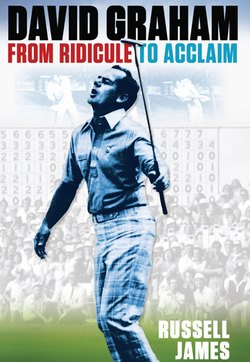Читать книгу David Graham - Russell James - Страница 5
На сайте Литреса книга снята с продажи.
PREFACE “What a high price I paid.”
ОглавлениеDavid Graham, one of Australia’s best ever golfers, “is abrasive and dogmatically opinionated. He can convey an impression of arrogance which is not entirely without substance.” These words appeared in the London newspaper, The Observer, the day after David Graham won the 1981 US Open Golf Championship. Their author was the noted golf writer Peter Dobereiner. Another respected golf correspondent, Peter Allis, described the young Australian in even less flattering terms. “He is a rather hard and sometimes bitter man”, he wrote soon after the Australian’s greatest triumph.
Descriptions such as these are not uncommon. From his very early days as a 14-year old trainee professional at Melbourne’s Riversdale Golf Club, Anthony David Graham frequently rubbed many people ‘up the wrong way’. Certainly very few of his fellow trainees had a good word to say about him. As a 17-year old trainee graduate starting out in the ‘hit or miss’ world of Monday pro-am events and later, on the Australian secondary tournament circuit, he quickly gained a reputation as being bad tempered, sullen and morose with little or no sense of humour.
When, in the early 1970s, he began to have some successes on Australia’s main PGA Tour and in Asia, he did precious little to befriend himself with other golfers. Also, tournament officials, sponsors, caddies, galleries and hotel staff often felt the brunt of his volatile temper. Significantly, David Graham’s anger with the world even extended to himself, and in no small measure.
By his own admission David Graham was “a brooder and a loner.” “I possessed a fierce temper and was scared to death of showing any emotion to anyone”, he said. David Graham was the epitome of ‘the angry young man’. When he played competitive golf it was always in a painfully slow manner and with little regard for his playing partners or any spectators. Probably the most damning criticism levelled at him was from some of his fellow professionals, “who dreaded being paired with him for a tournament round.”
Despite the many condemnations of him there were a few observers who thought it might just be a case of David Graham being extremely difficult to get to know. In this respect Peter Allis likened him to the great Ben Hogan. “Both men,” he noted, “had desperate struggles in their early days and both were very cautious in forming friendships.” In the immediate aftermath of Graham’s US Open victory in 1981, Allis recalled that Hogan and Jack Nicklaus were, in the early stages of their careers, respected for their golf games but not really admired for their temperaments, on and even off, the golf course. “The world learned to love Hogan and Nicklaus as well as respect them,” he concluded, “perhaps the same sort of thing will happen to the new US Open Champion.”
Put simply this didn’t happen. David Graham never achieved the widespread admiration that was afforded Hogan and Nicklaus nor that which many other major winners achieved in their careers. His reputation as the ‘hard man’ of world golf followed him throughout his playing days. But the David Graham of more recent years has mellowed, is less confrontational and certainly more personable.
This is not to say that David Graham no longer speaks his mind or frequently offends some people as a consequence. Golf Digest magazine, when interviewing him several years ago, described him as “a hard-edged character, irredeemingly stubborn, blunt and dogmatic.” This is probably an accurate description of the man today but one that needs to be tempered by the views of some of his peers. Fellow Australian golfer, Bruce Devlin, sees Graham as “honest, yes, even brutally honest, yet fiercely protective of his family and unswervingly loyal to his closest friends.”
Even David Graham’s severest critics acknowledge that his approach to golf, and life, has been influenced by the desperate struggles of his early days. A truant from school as a young boy, getting into fights that he never won, ridiculed as a loner, branded a loser, ostracised by his father at age fourteen, much of it was, in Graham’s own words, “pure hell.” Yet somehow he succeeded in spite of his upbringing and, it must be said, in spite of himself.
The years of “pain, discouragement and torment” helped make David Graham the type of golfer he became. That is, hard-edged, dour, resolute and always fiercely competitive. He practised longer than anyone else. He studied the technical aspects of the golf swing with religious fervour. He spent many hours willing himself to be mentally tough. Right from the outset he developed a thick outer shell to withstand the barbs and put-downs that continually came his way.
David Graham gave his whole life to golf but, as the man himself now reflects, “What a high price I paid.”
